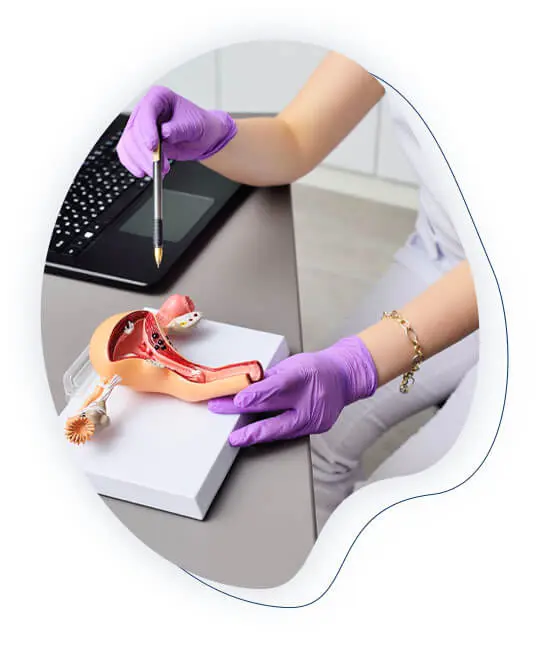Aram Clinic: The leader in cosmetic surgery
In vitro fertilization in Tunisia:
Start your family today
It is the wish of so many people to have children and start a family; it's in our nature to want that, to conceive and have offspring of our own; after all it's the only real legacy, that we could have plus the joy that a child brings to a couple is close to heaven.
However, mother nature can be a little cruel sometimes, there are many people that suffer from either physical disability that doesn't allow them to conceive naturally or their social status doesn't allow for that to happen.
But the days of that being a problem are long gone because In vitro fertilization in Tunisia is here to solve that problem thanks to the advancement of medical science.
In vitro fertilization in Tunisia is one of the best solutions for conceiving and starting a family, make your dream come true with this highly officiant process.

How much does In vitro fertilization in Tunisia costs?
In vitro fertilization is a highly advanced and a little complicated procedure, and it can be
costly for most people.
In countries like the U.K. or U.S. the price can be so high that most people just let go and
forget about doing the procedure all together.
However In vitro fertilization in Tunisia is strategically priced to suit everyone's needs.
In vitro fertilization in Tunisia costs almost 50% less than it is in other
countries, plus there is a range of highly classy 5 star hotels to help you with the post
operation resting time.
So don't let the price keep you from achieving your parental dream, because Tunisia
offers the best prices with the highest professionalism.
Where can i get In vitro fertilization in Tunisia?
Wanting children and trying to start a family can be a highly stressful and could take a lot
of time, especially when you search for the right choice for you.
Finding the combination of both a good price and a highly professional clinic is both
time consuming and hard, however Aram Clinic offers both of those option and many other
more.
With a medical staff that is highly educated and graduated from some of the top medical universities in the whole world, and with a facility that is loaded with the top of the line highly advanced medical tools, Aram Clinic is the right choice for you.
Not only that but In vitro fertilization in Tunisia has become the go to solution for infertility treatment, in fact many clinics across the whole country do perform the surgery; that is why Tunisia is considered one of the best spots for medical tourism.
Aram Clinic also performs In vitro fertilization in Tunisia with a price that no one can compete against and with an all-inclusive deal.
This deal includes:
- The costs of the initial Appointment.
- Follow-up and post-operative care.
- The medical team's fees.
- Hotel and transportation costs.
When deciding to have In vitro fertilization in Tunisia there is no better option than Aram Clinic to provide you with the best care the most relaxed after-care there is.


What is In vitro fertilization?
When trying to conceive a child, In vitro fertilization in Tunisia can be your best
chance to achieving your goal, it's true that the process can feel long and a little
intimidating but we assure you that it will go smoothly and simple.
In vitro fertilization is a complex series of operations that helps you with
fertility problems and getting pregnant.
The process has many steps, during it; a mature egg is removed from the woman's ovaries
and then fertilized in a lab using sperm.
After that the fertilized egg which is also called an embryo is inserted back
into the uterus.
The full cycle of IVF can take about three weeks, however the process can take
longer because the steps are split into different parts.
The procedure can be done using your eggs and sperm from your partner, a doner,
or from the sperm bank depending on what you desire.
The chances of success of In vitro fertilization depends on many factors
including your age and the cause of infertility.
Since the embryo is transferred into the uterus IVF (in vitro fertilization) can
result in a multiple pregnancy.
Who can have In vitro fertilisation?
Much like any other medical procedure, In vitro fertilisation requires some conditions and recommendations about the person that wants to get the operation.
It's usually aimed for women under the age of 43, and who have been trying to conceive through regular unprotected sexual intercourse for 2 years.
Also women who have had 12 cycles of artificial insemination, and 6 of those cycles have been using a method called intrauterine insemination or IUI.
How to prepare for the In vitro fertilisation procedure?
There are many steps that you need to go before having the IVF procedure.
Before starting the IVF cycle, you and your partner must have various screenings some of which are:
Ovarian reserve screening
This is a test of the woman's concentration of follicle-stimulating hormone (FSH), estradiol (estrogen) and anti-Millerian hormone to determine the condition and quality of the eggs.
This is done during the first days of your menstrual cycle.
Based on the test results and an ultrasound of your ovaries, the doctor can predict how your ovaries will respond to the fertility medication.
Semen testing.
In the case of the testing not being done in the initial fertility evaluation, the doctor will conduct the semen analysis just before the IVF treatment.
Infectious disease check-up
Both you and your partner must take a screened to determine you are clear of infections and diseases such as HIV.
Practice (mock) embryo transfer
This is done so that the doctor can determine how deep your uterine cavity and to also establish the best technique to successfully place the embryos into your uterus.
This is done using a mock embryo transfer.
Uterine exam
The doctor will use a method called sonohysterography to examine the inside lining of the uterus before the IVF cycle begins.
sonohysterography is done either by injecting fluid through the cervix and inro the uterus, or it could include a hysteroscopy where a thin flexible lighted telescope called a hysteroscope is inserted into the uterus through the vagina and cervix.
Other than these preparations you should ask your doctor some questions that include the process and your preferences like:
- How many embryos will be inserted?
- What will you do with any extra embryos?
- How will you handle a multiple pregnancy?
- Have you considered some of the potential complications that can come from using donor eggs, sperm or embryos, or a gestational carrier?
What happens during IVF?
After your physical and mental preparations and all the necessary testing, it is time to start the treatment.
Ovulation induction
The treatment starts by stimulating the ovaries to produce multiple eggs using synthetic hormones.
The doctor will fertilized multiple eggs instead of the usual monthly developed one because some eggs will not be fertilized normally during the procedure.
Your doctor will be describing to you some medication to help your ovaries develop more than 1 egg, some of these medications are:
- Medications for ovarian stimulation.
- Medications to prevent premature ovulation.
- Medications for oocyte maturation.
- Medications to prepare the lining of your uterus.
Typically ovarian stimulation will take about 1 to 2 weeks before your eggs are ready to be collected. You will need to have Vaginal ultrasound and blood tests to determine when the eggs are ready.
In some situations IVF cycles may need to be stopped and canceled before eggs collection, it may be a premature ovulation, Inadequate number of follicles developing oe having too many follicles developing which can cause a condition called ovarian hyperstimulation syndrome.
Egg retrieval
After about 34 to 36 hours of the last injection, the egg collecting will be done in your
doctor's clinic.
You will be sedated and given pain medication.
The typical method for egg retrieval is called Transvaginal ultrasound aspiration
which involves entering an ultrasound probe in the vaginal area to identify follicles,
after that a very thin needled goes into the ultrasound into the follicles to collect
the eggs.
The eggs are then taken out from the follicles through a needle that is connected
to a suction device, multiple eggs can be transferrer in about 20 minutes.
You may experience a feeling of cramping and feel a slight pressure after the
eggs are collected.
Once they are collected, the eggs will then be placed in nutritive liquid and
incubated.
Embryos will be created using only the eggs that appear to be healthy and mature
by missing them with sperm, however not all eggs will be successfully fertilized.
Fertilization
The fertilization process usually uses one of two common methods.
- Conventional insemination which means that sperm and eggs will be mixed overnight during conventional insemination.
- Intracytoplasmic sperm injection (ICSI) which is injecting a single healthy sperm directly inro each mature egg.
Embryo transfer
Usually takes 5 days after egg collection and is done in your doctor's office.
The procedure is usually pain free, however, you may be given a sedative for
cramping.
A thin flexible tube called a catheter will be inserted into your vaginal area
through the cervix and into your uterus.
Then a syringe that contains one or more embryos will be used to deliver the
embryos inro your uterus.
IF the procedure succeeded, an embryo will be implanted in the lining of your
uterus after 10 days of egg retrieval.
What are the risks of IVF?
Much like any other medical procedure IVF has some risks that you need to take into
consideration
before deciding on the treatment.
Some of these risks are:
- Multiple births.
- Premature delivery and low birth weight.
- Ovarian hyperstimulation syndrome.
- Miscarriage.
- Egg-retrieval procedure complications.
- Birth defects.
- Ectopic pregnancy.
- Stress.
What are the alternatives to IVF?
Although it is an efficient procedure, it may not be the best choice for you, that is may be due to some medical problems or other factors.
But not to worry there other alternatives to In vitro fertilisation such as:
- Medications to induce ovulation.
- Clomiphene citrate.
- Aromatase Inhibitors: Letrozole.
- Metformin.
- Gonadotropins.
- Intrauterine insemination.
Conclusion
Wanting to conceive and wishing to start a family is the dream of som many people, and with IVF it's
now possible to achieve that dream even if you naturally can't.
In vitro fertilization in Tunisia has a fairly high success rate and at Aram Clinic you will
be guaranteed the most relaxed experience.
Aram Clinic practises In vitro fertilization in Tunisia using the top medical professionals
in the whole country and with the most highly advanced medical tools.


